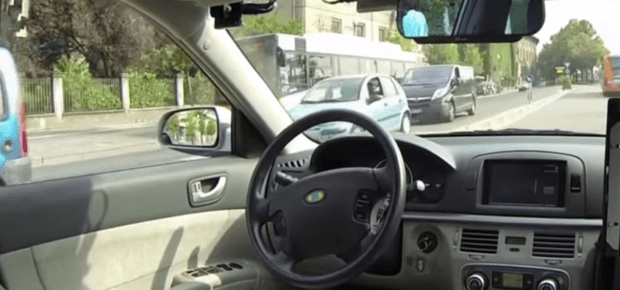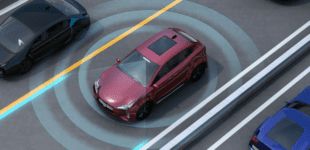July 31, 2015
There’s no denying that autonomy is one of many forces steering the future of the auto industry.
Google and other automakers continue to test their driverless cars on the streets of California – and now Texas – but they have one major question to answer before reaching the consumer: who’s really in the driver’s seat when there’s an accident? As it turns out, this isn’t just a science blunder; it’s also a question of ethics.
In an article from Bloomberg, Keith Naughton boils the ethical dilemma down to say that, “the problem with giving an an autonomous automobile the power to make consequential decisions is that, like the robots of science fiction, a self-driving car still lacks empathy and the ability to comprehend nuance.”
Google released a driverless car report in May, and it disclosed that over the past 6 years and 1.8 million miles (autonomous and manual) traveled, its vehicles had been in 12 accidents. Google went on to say that like 94% of all auto accidents, these were the fault of human error, and not the autonomous vehicle.
Google’s move to extend its testing to Austin, TX was a critical step, according to Lance Whitney of CNET. By expanding their testing area, the vehicles will be faced with new navigational challenges and changing driving conditions.
Location changes are only one measure being taken to improve how these cars share the road with manual human drivers. In his article, Whitney shares intel from a Google spokeswoman who described the defensive driving behavior that they build into their vehicles so that they inherently avoid actions that could cause an accident.
In our Driverless Car Confessions series, IEEE Fellow Alberto Broggi took viewers beyond Mountainview and Austin, as he traveled from Parma, Italy to Shanghai, China. Broggi’s work is specifically related to artificial vision. He engineers artificial vision by placing small – almost invisible – cameras throughout the vehicles to help simulate perception.
Broggi stressed the importance of training cars on environmental perception – knowing what challenges exist in particular destinations. His trip through urban and rural roads, for example, helped train his vehicle on different traffic conditions, as well as changes in terrain and weather.
Auto giants from Ford to Tesla have recently joined Google in commenting on their own autonomous ambitions, and while we’re still years away from autonomous cars conquering highway roads – Google cars are currently capped at 25 miles per hour – driverless cars could help save lives when they eventually – 10 years or so down the line, according to the Boston Consulting Group – become the norm.





 Meaningful Momentum or Running in Place?
Meaningful Momentum or Running in Place? AI Through Our Ages
AI Through Our Ages Liquid Infrastructure: Our Planet's Most Precious Resource
Liquid Infrastructure: Our Planet's Most Precious Resource The Impact of Technology in 2025
The Impact of Technology in 2025 Quantum and AI: Safeguards or Threats to Cybersecurity?
Quantum and AI: Safeguards or Threats to Cybersecurity? Why AI Can't Live Without Us
Why AI Can't Live Without Us Bits, Bytes, Buildings and Bridges: Digital-Driven Infrastructure
Bits, Bytes, Buildings and Bridges: Digital-Driven Infrastructure Impact of Technology in 2024
Impact of Technology in 2024 Emerging AI Cybersecurity Challenges and Solutions
Emerging AI Cybersecurity Challenges and Solutions The Skies are Unlimited
The Skies are Unlimited Smart Cities 2030: How Tech is Reshaping Urbanscapes
Smart Cities 2030: How Tech is Reshaping Urbanscapes Impact of Technology 2023
Impact of Technology 2023 Cybersecurity for Life-Changing Innovations
Cybersecurity for Life-Changing Innovations Smarter Wearables Healthier Life
Smarter Wearables Healthier Life Infrastructure In Motion
Infrastructure In Motion The Impact of Tech in 2022 and Beyond
The Impact of Tech in 2022 and Beyond Cybersecurity, Technology and Protecting Our World
Cybersecurity, Technology and Protecting Our World How Technology Helps us Understand Our Health and Wellness
How Technology Helps us Understand Our Health and Wellness The Resilience of Humanity
The Resilience of Humanity Harnessing and Sustaining our Natural Resources
Harnessing and Sustaining our Natural Resources Creating Healthy Spaces Through Technology
Creating Healthy Spaces Through Technology Exceptional Infrastructure Challenges, Technology and Humanity
Exceptional Infrastructure Challenges, Technology and Humanity The Global Impact of IEEE's 802 Standards
The Global Impact of IEEE's 802 Standards Scenes of our Cyber Lives: The Security Threats and Technology Solutions Protecting Us
Scenes of our Cyber Lives: The Security Threats and Technology Solutions Protecting Us How Millennial Parents are Embracing Health and Wellness Technologies for Their Generation Alpha Kids
How Millennial Parents are Embracing Health and Wellness Technologies for Their Generation Alpha Kids Space Exploration, Technology and Our Lives
Space Exploration, Technology and Our Lives Global Innovation and the Environment
Global Innovation and the Environment How Technology, Privacy and Security are Changing Each Other (And Us)
How Technology, Privacy and Security are Changing Each Other (And Us) Find us in booth 31506, LVCC South Hall 3 and experience the Technology Moon Walk
Find us in booth 31506, LVCC South Hall 3 and experience the Technology Moon Walk Virtual and Mixed Reality
Virtual and Mixed Reality How Robots are Improving our Health
How Robots are Improving our Health IEEE Experts and the Robots They are Teaching
IEEE Experts and the Robots They are Teaching See how millennial parents around the world see AI impacting the lives of their tech-infused offspring
See how millennial parents around the world see AI impacting the lives of their tech-infused offspring Take the journey from farm to table and learn how IoT will help us reach the rising demand for food production
Take the journey from farm to table and learn how IoT will help us reach the rising demand for food production Watch technical experts discuss the latest cyber threats
Watch technical experts discuss the latest cyber threats Explore how researchers, teachers, explorers, healthcare and medical professionals use immersive technologies
Explore how researchers, teachers, explorers, healthcare and medical professionals use immersive technologies Follow the timeline to see how Generation AI will be impacted by technology
Follow the timeline to see how Generation AI will be impacted by technology Learn how your IoT data can be used by experiencing a day in a connected life
Learn how your IoT data can be used by experiencing a day in a connected life Listen to technical experts discuss the biggest security threats today
Listen to technical experts discuss the biggest security threats today See how tech has influenced and evolved with the Games
See how tech has influenced and evolved with the Games Enter our virtual home to explore the IoT (Internet of Things) technologies
Enter our virtual home to explore the IoT (Internet of Things) technologies Explore an interactive map showcasing exciting innovations in robotics
Explore an interactive map showcasing exciting innovations in robotics Interactively explore A.I. in recent Hollywood movies
Interactively explore A.I. in recent Hollywood movies Get immersed in technologies that will improve patients' lives
Get immersed in technologies that will improve patients' lives